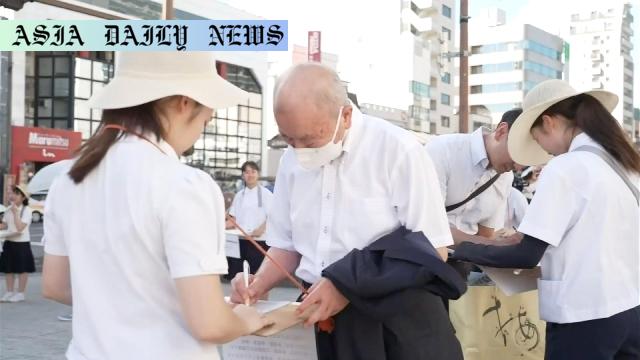Peace Messengers: Japanese students strive to advocate for nuclear disarmament, representing younger generations in the UN conference.
- Key Point 1: Japanese high school students from Hiroshima and Nagasaki represent younger generations as Peace Messengers at the UN conference.
- Key Point 2: The Treaty on the Prohibition of Nuclear Weapons has been ratified by 73 countries, and the third Meeting of States Parties will occur in New York in March.
- Key Point 3: Students will engage in discussions, attend events, and advocate for the abolition of nuclear weapons, joined by atomic bomb survivors.
- Key Point 4: The Japanese government considers sending lawmakers but does not plan to attend with observer status.

Introduction: A Mission of Peace
In a remarkable effort to advocate for global peace and the abolition of nuclear weapons, four high school students from the iconic Japanese cities of Hiroshima and Nagasaki will attend the third Meeting of States Parties to the Treaty on the Prohibition of Nuclear Weapons. Representing younger generations as Peace Messengers, these students bring a powerful voice to one of the most critical global discussions of our time.
The Treaty on the Prohibition of Nuclear Weapons
The Treaty on the Prohibition of Nuclear Weapons, which has been ratified by 73 countries and territories, is a landmark international accord aimed at eliminating nuclear arms. This treaty is particularly significant for the people of Hiroshima and Nagasaki, cities forever marked by the devastating effects of atomic bombs in 1945. The upcoming UN conference in New York, scheduled for March, seeks to further the goals of the treaty and reinforce international commitment to nuclear disarmament.
The Vital Role of Young Peace Messengers
These four students are not simply attending a meeting but are taking on an important role as Peace Messengers. Their task involves conveying heartfelt messages from atomic-bombed cities, symbolizing the aspirations of a new generation. Among them is Kobayashi Mayu, a second-year student from Nagasaki, who exemplifies the dedication and courage required for this mission. Their visit is planned from March 2 to 7, during which they will immerse themselves in discussions with peace groups and engage with other young advocates.
Learning and Advocacy Opportunities
Their time in New York will be rich with activity. In addition to observing the meeting, the young ambassadors will participate in interactive events, fostering global youth collaboration. Through discussions and activities, they intend to address the contemporary challenges of nuclear proliferation and build networks with like-minded individuals who share their vision for a peaceful world. These efforts underscore the indispensable role of youth in creating long-term change.
Collaboration with Atomic Bomb Survivors
Accompanying the Peace Messengers is Nihon Hidankyo, a Nobel Peace Prize-winning organization composed of atomic bomb survivors. Two survivors will attend the conference, providing a unique historical perspective on why nuclear weapons must be eradicated. Their testimonies remain a powerful reminder of the catastrophic humanitarian consequences of nuclear arms.
The Position of the Japanese Government
Despite the participation of citizens and survivors, the stance of the Japanese government has been a topic of debate. While lawmakers from the ruling coalition (Liberal Democratic Party and Komeito) may attend the conference, Japan does not plan to join with observer status. Survivors and advocacy groups have called on the government to take a firm stand at the meeting, amplifying their commitment to disarmament. However, the lack of formal observer participation has drawn criticism from activists and global peacemakers.
A Call for Global Unity
Nuclear disarmament is a shared responsibility that transcends national borders. The presence of these students signifies hope, reminding the international community of the importance of perseverance and youth-led initiatives. Their participation in the UN conference is a stepping stone towards uniting global efforts in achieving a world free of nuclear arms.
Conclusion: The Next Generation of Global Advocates
The efforts of these Peace Messengers, combined with the voices of survivors and advocates, serve as a call to action for nations worldwide. Their journey to New York exemplifies the possibility of youth leadership in tackling some of the world’s most complex issues. As they champion the eradication of nuclear weapons, they inspire us all to strive for a safer, more peaceful world.



Commentary
Empowering the Next Generation
The participation of high school students from Hiroshima and Nagasaki as Peace Messengers is a remarkable testament to the power of youth advocacy. At a time when the voice of younger generations often feels overshadowed by the weight of global issues, these students are stepping forward with courage and determination. Their mission to represent their atomic-bombed cities at the UN nuclear ban treaty conference highlights the potential of young individuals to act as change-makers in the international arena.
The Significance of Representation
Hailing from cities that carry the scars of nuclear devastation, these students bring a unique and personal perspective to the discussions of nuclear disarmament. Their involvement ensures that the voices of survivors and victims are not forgotten, bridging the gap between past tragedies and future aspirations. It is a poignant reminder that meaningful change often begins at the grassroots, with individuals willing to advocate for what they believe in.
The Role of Nations in Supporting Peace
While the action of students and peace groups is commendable, the role of governments cannot be ignored. Japan, as the only nation to have suffered atomic bombings, holds a moral responsibility to lead the global conversation on nuclear disarmament. The reluctance of the Japanese government to fully participate in the UN conference raises questions about its commitment to the cause, despite the continued suffering of atomic bomb survivors.
A Global Responsibility
Ultimately, the success of the nuclear ban treaty depends on collaboration among nations, organizations, and individuals. These Peace Messengers remind us that each of us has a role to play in promoting global peace. Their efforts inspire hope for a future free from the threat of nuclear weapons and a world where the lessons of history guide us towards a more harmonious existence.